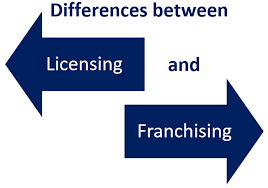



Licensing and franchising are sometimes used to mean the same thing, but there are differences. Determining the amount of control you want to have in a business is the key to choosing whether licensing or franchising is the right option for you.
First, it’s important to understand the difference between these two models. Licensing refers to the right of a business partner to use a system or trademark. It is often used in situations where technology is sold through a distribution system – think of software that is sold through a licensed distributor. Licensing also applies in business relationships in which a name is licensed to someone to do business under a trade or service mark.
Franchising describes a situation in which a name, brand, or trademark is used in addition to a business system. It requires the use of a Uniform Franchise Disclosure Document identifying and disclosing relationship details and commitments. In this arrangement, the franchisor has control of operations and quality of service. Franchising is subject to greater regulation than licensing, and there are strict processes and rules enacted by the FTC for franchises.
You would choose franchising if you want greater control. Franchise expansion gives you control over services and when and how your brand is used. You are able to stop franchisees who inappropriately represent your brand and do not meet your standards.
So if you want control over your brand, you will want to take the franchise route, even though you are subject to greater regulations. If you prefer to put your system or trademark out into the world with less control over how it is used, licensing is the better option for you.
If you are still unsure which option you prefer or you want to learn more about successful franchising or growing an existing franchise, let us know how we can help!
♦ By: Jason R. Anderson
